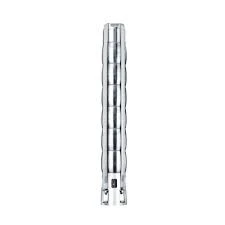Oct . 19, 2024 05:18 Back to list
Non-Submersible Deep Well Pumps for Efficient Water Extraction Solutions
Non-Submersible Deep Well Pumps An Overview
In the realm of water extraction and irrigation systems, deep well pumps play a critical role, especially in areas where surface water sources are scarce. Among these pumps, non-submersible deep well pumps stand out for their unique design and operational efficiency. This article explores the characteristics, advantages, applications, and maintenance of non-submersible deep well pumps, shedding light on why they are an essential component in various water supply systems.
What is a Non-Submersible Deep Well Pump?
A non-submersible deep well pump, also known as a vertical turbine pump, is designed for use in deep wells, where it can draw water from significant depths—often exceeding 100 feet. Unlike submersible pumps that operate underwater, non-submersible pumps are situated above the well. They use a motor that is mounted on the surface, and through a series of vertical shafts, they transfer power down to the water inlet, making it an excellent choice for deep groundwater extraction.
Key Characteristics
1. Above-Ground Installation Non-submersible pumps are installed above the ground, which simplifies maintenance and inspection procedures. This installation method also protects the motor from potential submergence-related issues like corrosion or electrical failure.
2. High Efficiency These pumps are engineered to deliver high pumping efficiencies at significant depths. They can handle high volumes of water and are often equipped with multistage designs to increase pressure output without the need for excessive power.
3. Durability and Reliability Constructed with robust materials to withstand harsh conditions, non-submersible deep well pumps are designed for long service lives. Their open design incorporates fewer moving parts, which may help reduce maintenance requirements.
4. Versatility Non-submersible pumps can be configured for various applications, from agricultural irrigation to municipal water supply. They can be adapted for both clean water extraction and even for certain wastewater applications, provided they are designed accordingly.
Advantages
Non-submersible deep well pumps offer several advantages
non submersible deep well pump

1. Easier Maintenance Since the motor and drive components are above ground, technicians can easily access and service the pump without the need for diving or special equipment.
2. Reduced Risk of Contamination With the components above the water level, non-submersible pumps minimize the risk of contaminants entering the water supply, enhancing water quality.
3. Greater Air Cooling Above-ground motors benefit from better airflow for cooling, which can extend the lifespan of the pump and its components, especially in hot climates.
4. Flexible Installation Options These pumps can be installed in various well configurations—vertical or horizontal—allowing for adaptability to specific site conditions.
Applications
Non-submersible deep well pumps are widely utilized across multiple sectors
- Agriculture Farmers use these pumps for irrigation to ensure crops receive adequate water supply. - Residential Use Homeowners in rural areas often rely on non-submersible pumps to access groundwater for domestic use. - Industrial Applications Industries requiring a reliable water supply for processes or cooling systems can benefit from the efficiency and durability of these pumps. - Municipal Water Supply Many municipalities employ non-submersible pumps to extract and distribute potable water.
Maintenance and Considerations
To ensure optimal performance, regular maintenance and inspections of non-submersible deep well pumps are essential. This includes checking the motor for wear, ensuring electrical connections are secure, and monitoring for any signs of leaks or mechanical issues. Users should also consider the specific environmental conditions of their installation site, such as water quality and temperature, to select appropriately rated pumps that meet their needs.
Conclusion
In summary, non-submersible deep well pumps are a vital technology for efficient groundwater extraction. Their unique design and operational advantages, coupled with their versatility across different applications, make them an invaluable asset in both agricultural and municipal water supply systems. As water scarcity continues to challenge various regions worldwide, the role of efficient pumping solutions like non-submersible deep well pumps becomes increasingly important in sustaining availability and promoting effective water management.
-
Submersible Water Pump: The Efficient 'Power Pioneer' of the Underwater World
NewsJul.01,2025
-
Submersible Pond Pump: The Hidden Guardian of Water Landscape Ecology
NewsJul.01,2025
-
Stainless Well Pump: A Reliable and Durable Pumping Main Force
NewsJul.01,2025
-
Stainless Steel Submersible Pump: An Efficient and Versatile Tool for Underwater Operations
NewsJul.01,2025
-
Deep Well Submersible Pump: An Efficient 'Sucker' of Groundwater Sources
NewsJul.01,2025
-
Deep Water Well Pump: An Efficient 'Sucker' of Groundwater Sources
NewsJul.01,2025
-
 Submersible Water Pump: The Efficient 'Power Pioneer' of the Underwater WorldIn the field of hydraulic equipment, the Submersible Water Pump has become the core equipment for underwater operations and water resource transportation due to its unique design and excellent performance.Detail
Submersible Water Pump: The Efficient 'Power Pioneer' of the Underwater WorldIn the field of hydraulic equipment, the Submersible Water Pump has become the core equipment for underwater operations and water resource transportation due to its unique design and excellent performance.Detail -
 Submersible Pond Pump: The Hidden Guardian of Water Landscape EcologyIn courtyard landscapes, ecological ponds, and even small-scale water conservancy projects, there is a silent yet indispensable equipment - the Submersible Pond Pump.Detail
Submersible Pond Pump: The Hidden Guardian of Water Landscape EcologyIn courtyard landscapes, ecological ponds, and even small-scale water conservancy projects, there is a silent yet indispensable equipment - the Submersible Pond Pump.Detail -
 Stainless Well Pump: A Reliable and Durable Pumping Main ForceIn the field of water resource transportation, Stainless Well Pump has become the core equipment for various pumping scenarios with its excellent performance and reliable quality.Detail
Stainless Well Pump: A Reliable and Durable Pumping Main ForceIn the field of water resource transportation, Stainless Well Pump has become the core equipment for various pumping scenarios with its excellent performance and reliable quality.Detail
